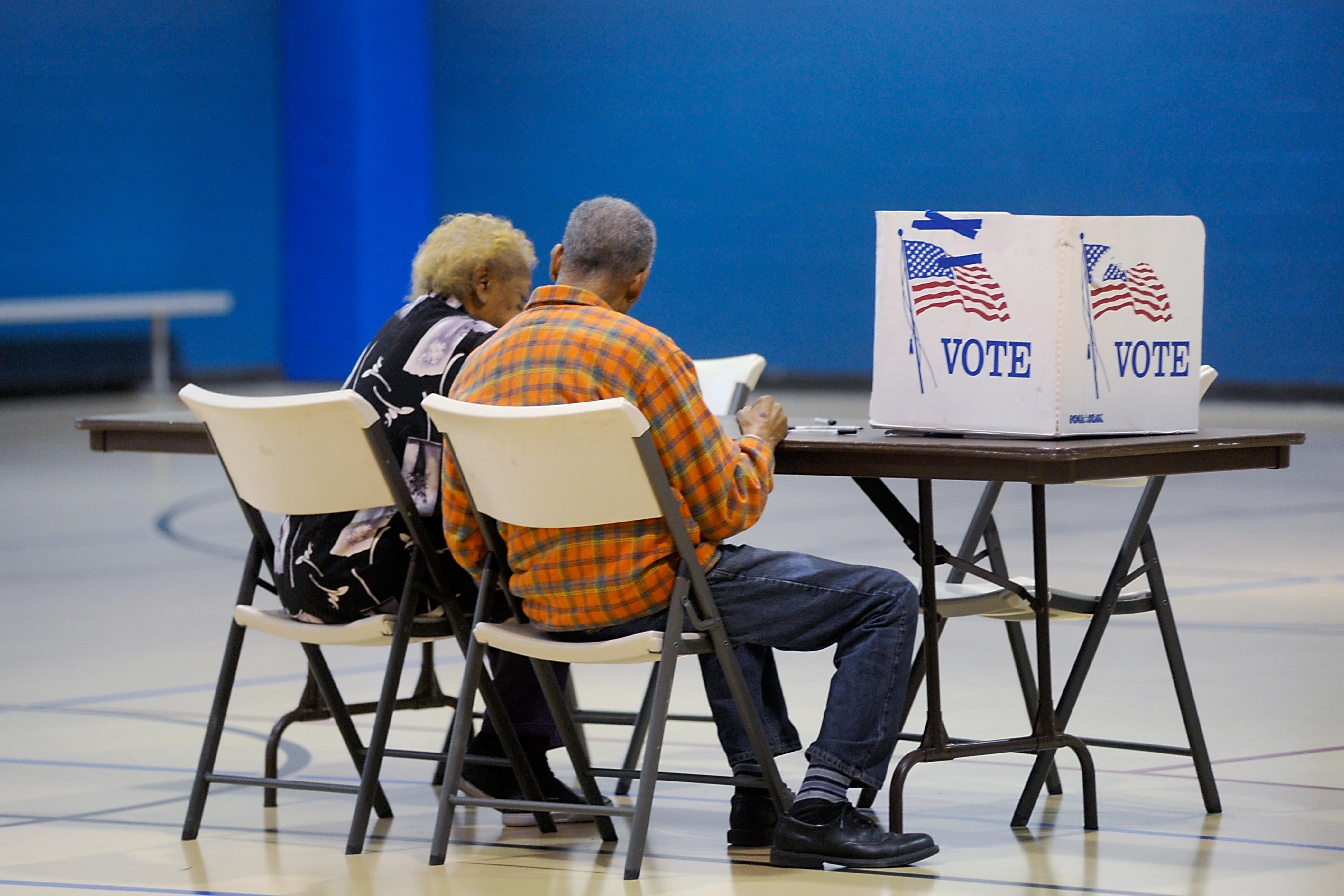Since the 2013 Supreme Court decision overturning parts of the Voting Rights Act, North Carolina has been in the vanguard of legislative voter suppression. First, Republicans in the state passed a huge law containing five different provisions aimed at discouraging voting, from limiting early voting hours to excluding certain forms of identification used disproportionately by black voters. The 4th U.S. Circuit Court of Appeals blocked the measure in 2016 because it “target[ed] African Americans with almost surgical precision.”
Since then, the state GOP has succeeded in pursuing further rollbacks of early voting and in purging thousands of voters from the rolls. Republican legislators have also managed to get a constitutional amendment put on the ballot this November that would require voters to show ID at the polls. If it passes, the measure would likely “block the Democrat-controlled state Supreme Court from striking down any voter ID requirement,” the former counsel for the North Carolina Legislature told HuffPost.
Given that impersonation fraud is essentially nonexistent, that proposed constitutional amendment is clearly an attempt to suppress turnout among likely Democrats by making voting harder. Although the North Carolina GOP has never been very good at hiding the intent behind its voting proposals, a pernicious new law just passed by the legislature suggests that might be changing. The statute, which passed over the Democratic governor’s veto, claims to expand access to voting but is likely to have the opposite effect. “It looks like another attempt to surgically target African Americans,” said Courtney Patterson, chairman of the Board of Elections for Lenoir County.
The new measure, which will take effect for the upcoming midterm elections, requires every early voting site in the state to stay open 12 hours a day each weekday (in addition to any weekend hours). By mandating such a large number of hours, the new rule will make it prohibitively expensive for some counties to operate early voting locations. Because the law was passed very late in the legislative session, after many counties set their election budgets, many smaller counties will likely be required to close early voting locations so they don’t overspend. “This bill came out of nowhere. County officials weren’t told about it,” said Tomas Lopez, the executive director of the civil rights group Democracy North Carolina. “It’s making it much more expensive to actually conduct an early voting program that reaches as many voters as possible.”
Lenoir County, a rural area of about 60,000 people near Raleigh, offers one telling example. In 2016, the county operated six early voting sites for a total of 600 hours. The law will require them to double the total number of hours, entailing an additional expense of around $20,000 in a county in which the total elections budget is only $600,000. “We’re going to have to request more money from the county … chances are they’re going to say that additional funding is not available,” Patterson, the county’s Board of Elections chairman, told me. If that additional money isn’t on offer, Lenoir County may have to reduce its early voting sites by half. “It will wind up, in many counties, cutting access to early voting,” Patterson said.
Dallas Woodhouse, executive director of the North Carolina Republican Party, contends that Democrats gamed the flexible schedules of polling places by keeping sites in heavily Democratic neighborhoods open for longer hours. Woodhouse says the new law is an effort to prevent those practices and make voting hours fair. “We are going to follow the letter and spirit of the court order,” Woodhouse wrote in an emailed statement, referring to the 4th Circuit’s 2016 ruling that blocked an earlier GOP attempt to cut early voting in the state from 17 days to 10. “The costs to the local counties were not a concern by the leftist groups when they sued us, so they can’t be a concern now.”
Despite Woodhouse’s claims that the law is intended to make voting hours uniform, it’s clear it was passed with partisan aims. For one thing, Woodhouse is no stranger to efforts to control turnout: Prior to the 2016 election, he wrote a memo to county election boards urging them to close and cut hours at as many early voting sites as possible. One of the clearest signs this bill is intended to suppress turnout is that it specifically forbids early voting sites from opening on the Saturday before the election. According to civil rights groups, nearly 200,000 people voted that day in 2016, and those who cast ballots were disproportionately black. Another bill passed a few days later restored access to the polls on that Saturday, but only for the 2018 elections; Friday will be the last early voting day in subsequent election cycles.
Until elections officials finalize their plans for the midterms, it’s impossible to know how many early voting sites will be closed because of the new rules. Since early voting is disproportionately used by black voters (60.4 percent and 64.0 percent of black North Carolina voters cast their ballots early in 2008 and 2012, respectively, compared to 44.5 and 49.4 percent of white voters), any reduction in the number of sites will likely result in a discriminatory impact. In 2016, thanks in part to local cuts in access to early voting urged by Woodhouse, black early voting turnout declined by almost 9 percent in North Carolina, or more than 65,000 votes. In other Southern states, meanwhile, early turnout among black voters increased.
What makes this law so devious is that, unlike previous efforts to curtail voting on the basis of voter fraud or impersonation, it is cloaked in technical language that appears to promote voting rights. “The state has put this forward in kind of masked terms,” said Emily Seawell, an attorney with the American Civil Liberties Union’s North Carolina chapter. Despite the subterfuge, the end result likely won’t differ from previous outcomes orchestrated by the North Carolina GOP: It will shut down early voting and prevent black voters from casting ballots.
